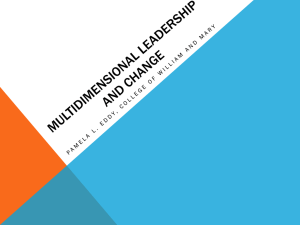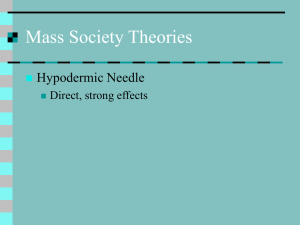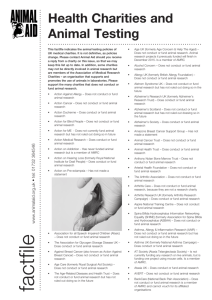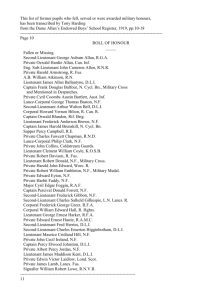Transition Guide - Jones & Bartlett Learning
advertisement
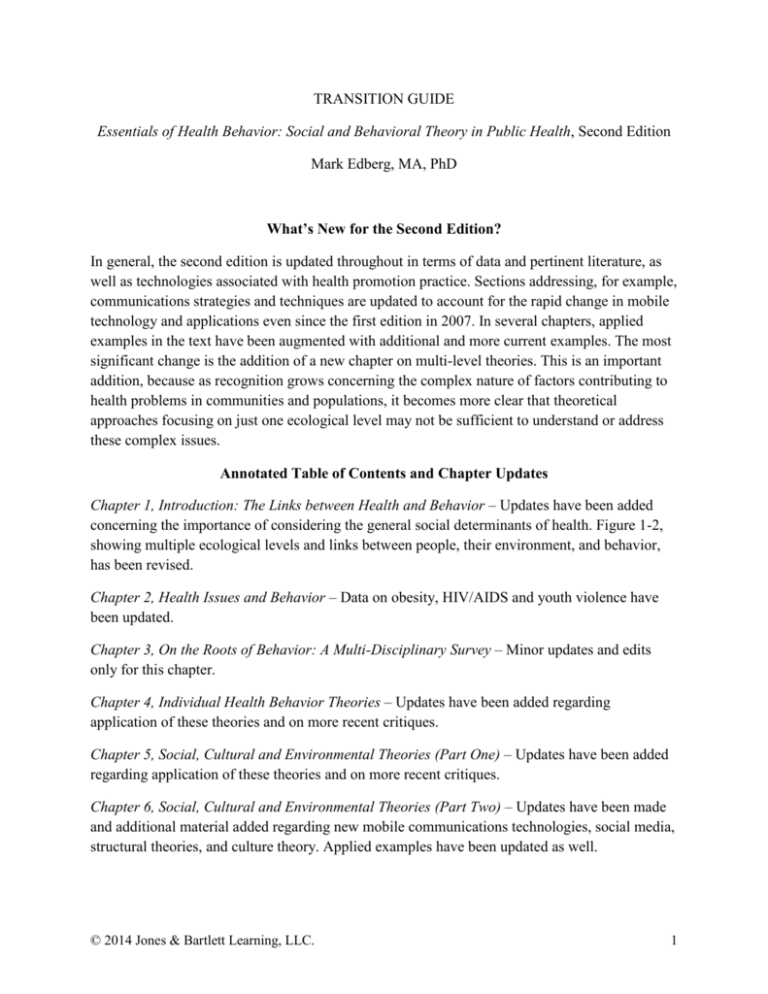
TRANSITION GUIDE Essentials of Health Behavior: Social and Behavioral Theory in Public Health, Second Edition Mark Edberg, MA, PhD What’s New for the Second Edition? In general, the second edition is updated throughout in terms of data and pertinent literature, as well as technologies associated with health promotion practice. Sections addressing, for example, communications strategies and techniques are updated to account for the rapid change in mobile technology and applications even since the first edition in 2007. In several chapters, applied examples in the text have been augmented with additional and more current examples. The most significant change is the addition of a new chapter on multi-level theories. This is an important addition, because as recognition grows concerning the complex nature of factors contributing to health problems in communities and populations, it becomes more clear that theoretical approaches focusing on just one ecological level may not be sufficient to understand or address these complex issues. Annotated Table of Contents and Chapter Updates Chapter 1, Introduction: The Links between Health and Behavior – Updates have been added concerning the importance of considering the general social determinants of health. Figure 1-2, showing multiple ecological levels and links between people, their environment, and behavior, has been revised. Chapter 2, Health Issues and Behavior – Data on obesity, HIV/AIDS and youth violence have been updated. Chapter 3, On the Roots of Behavior: A Multi-Disciplinary Survey – Minor updates and edits only for this chapter. Chapter 4, Individual Health Behavior Theories – Updates have been added regarding application of these theories and on more recent critiques. Chapter 5, Social, Cultural and Environmental Theories (Part One) – Updates have been added regarding application of these theories and on more recent critiques. Chapter 6, Social, Cultural and Environmental Theories (Part Two) – Updates have been made and additional material added regarding new mobile communications technologies, social media, structural theories, and culture theory. Applied examples have been updated as well. © 2014 Jones & Bartlett Learning, LLC. 1 NEW Chapter 7, Multilevel Theories – This is an entirely new chapter, added to introduce theories that have attempted to integrate behavioral influences across multiple ecological levels. Chapter 8, Doing Something About It: The Ecological Perspective and the Move From Theory to Practice – Formerly Chapter 7. Updates regarding data sources for program planning assessments, and updated literature included regarding risk and protective factor planning frameworks. Chapter 9, Communities and Populations as Focus for Health Promotion Programs – Formerly Chapter 8. Minor updates, as well as the addition of information and examples regarding virtual communities. Chapter 10, Application of Theory: Schools and Worksites – Formerly Chapter 9. Content and application updates throughout, and added reference to the Affordable Care Act (related to workplace health). Chapter 11, Application of Theory: Communications Campaigns – Formerly Chapter 10. Substantial updates include discussion of social media, mobile technology, YouTube and similar Internet formats, branding of communication campaigns, and updated application examples. Chapter 12, Application of Theory: Global Health – Formerly Chapter 11. Updated data, data sources and global health issues, as well as new application examples added (related to new media use in a global context). Chapter 13, Application of Theory: High-Risk and Special Populations – Formerly Chapter 12. Updated data and expanded description of high risk populations as well as social conditions contributing to such risk. . Chapter 14, Evaluation: What Is It? Why Is It Needed? How Does It Relate to Theory? – Formerly Chapter 13. Usage of “outcome” and “impact” evaluation terms changed from first edition, to reflect more current use pattern. Minor updates on content, qualitative evaluation methodologies, and evaluation context. Chapter 15, Culture, Diversity and Health Disparities: Are Current Theories Relevant? – Formerly Chapter 14. Substantial updates on health disparity data. Additional discussion added about a new framework for understanding diversity and health disparities. Chapter 16, Career Choices and Social/Behavioral Theory in Public Health: A Brief Introduction – Formerly Chapter 15. New example of a career path added (for which a knowledge of social/behavioral theory is important). © 2014 Jones & Bartlett Learning, LLC. 2





